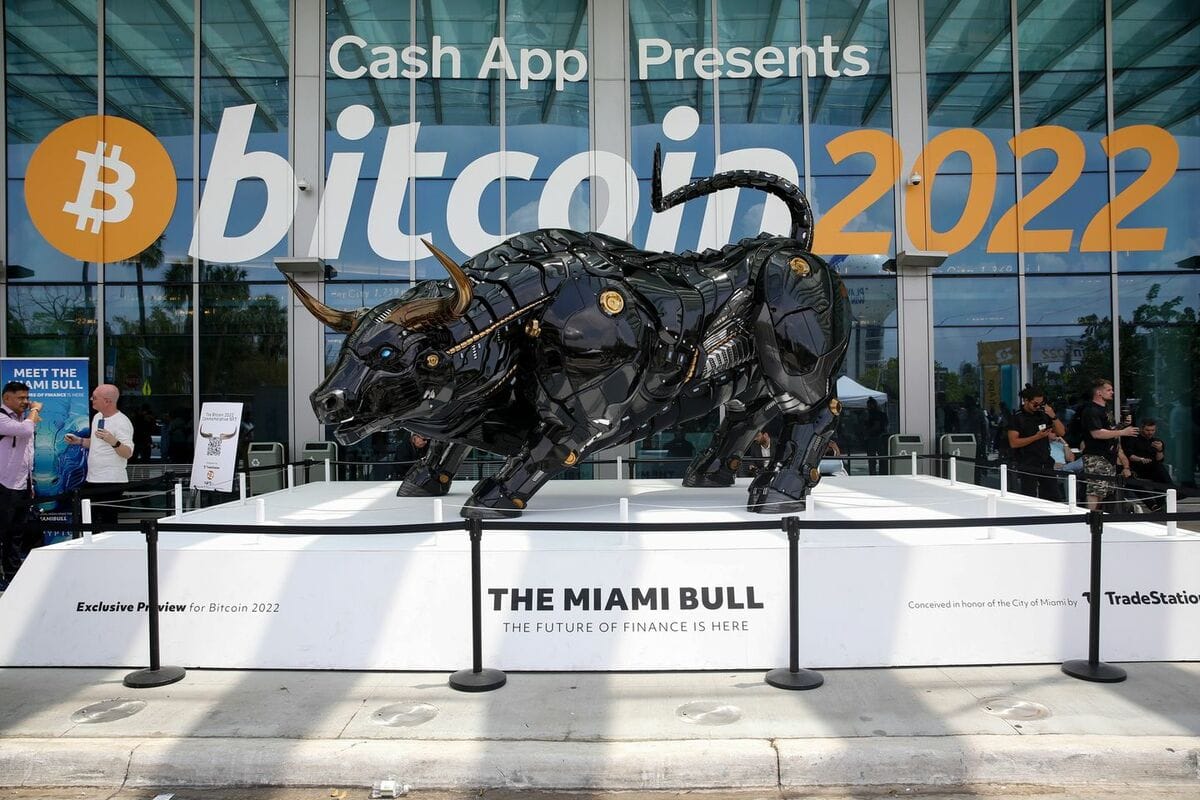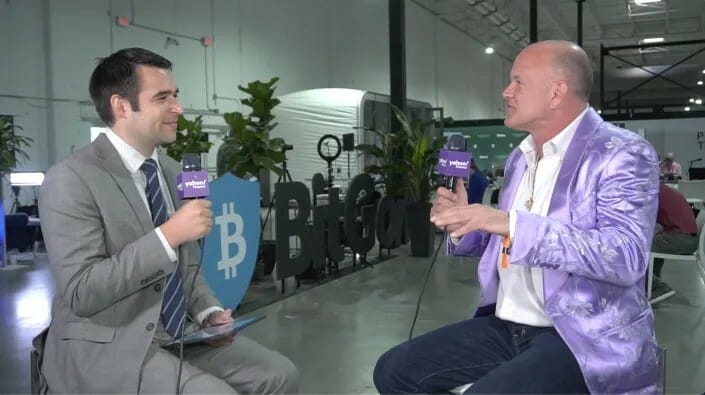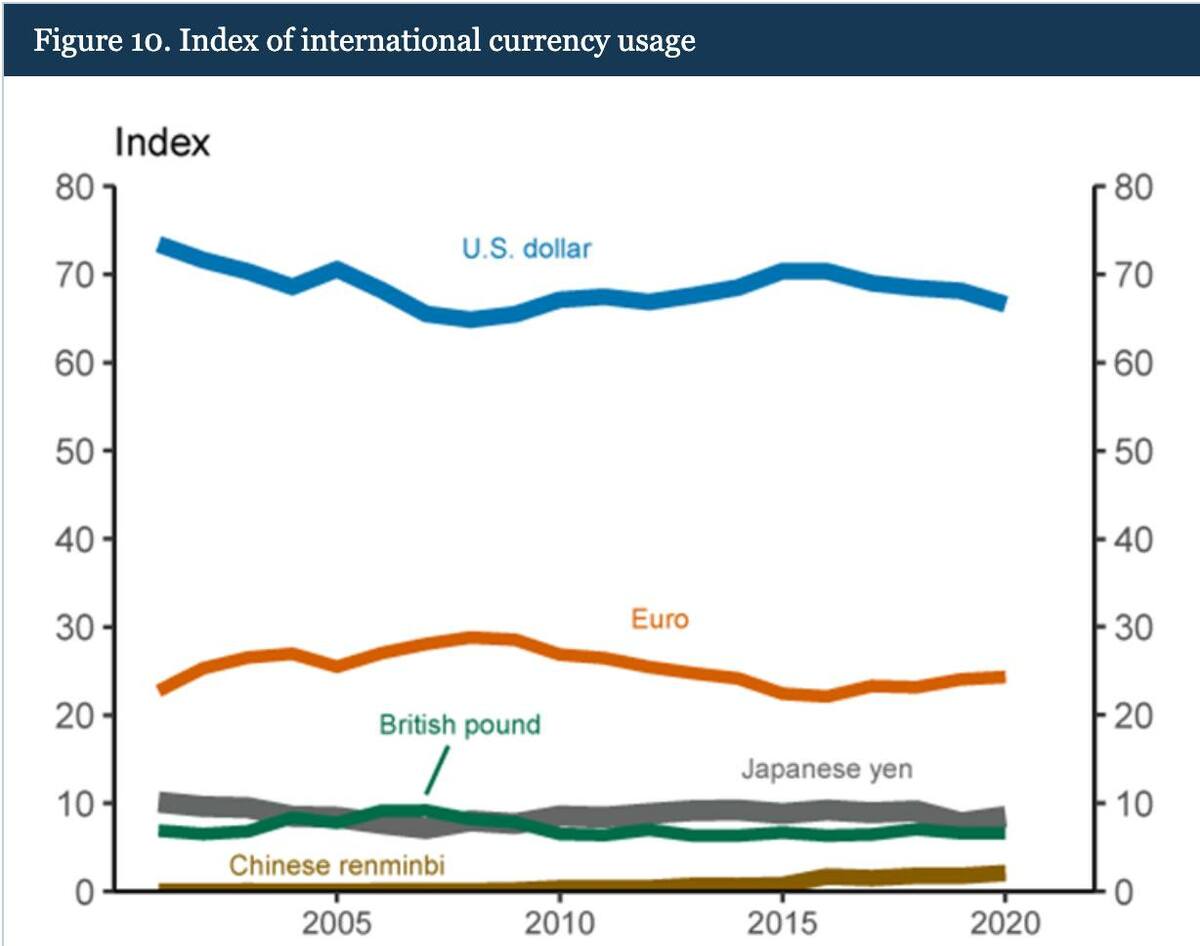- Crypto Uncomplicated
- Posts
- Can you be a patriot and still hope bitcoin's price hits $1 million?
Can you be a patriot and still hope bitcoin's price hits $1 million?
The (not so) false dichotomy between bitcoin and the dollar

Crypto Uncomplicated is a free crypto newsletter distilling all the happenings in the crypto space. Unlock the full experience as a premium subscriber by signing up here.
Last week, premium subscribers learned more about Thorchain, a crypto project that's up 70% on the year, and were the first to get in on the 40% surge in Terra since Zack wrote about how the crypto project is revolutionizing stablecoins back in February. Upgrade now!
A longer wait for the men's bathroom than the women's, an unusually frequent mention of El Salvador, and Miami's hottest club scrupulously packed full of nerds can only mean one thing: It's the return of the annual bitcoin conference in Miami.
This week, thousands of Bitcoiners descended on Bitcoin 2022, the largest bitcoin conference in the US, to hear from a few of crypto's most outspoken thought-leaders.
PayPal co-founder Peter Thiel kicked off his keynote by tossing $100 bills into the crowd before calling Warren Buffett "a sociopathic grandpa from Omaha." Wyoming Senator Cynthia Lummis walked out to a fire Skrillex song. And a statue of a coked-up Charging Bull with laser eyes was unveiled to metaphorically challenge Wall Street as the next generation financial capital of the world.
The art was a fitting parallel for a conference dedicated to celebrating bitcoin and the revolution it's leading against "TradFi" or traditional finance. Of course, as a signal of how those worlds are increasingly colliding, the conference also included chats from two crypto converts from the old investment world in Shark Tank's Kevin O'Leary (whom I interviewed there last year) and ARK Invest's Cathie Wood.
The conference began with a theme touched on by almost all the speakers, including its first keynote speaker, billionaire investor and founder of Galaxy Digital Mike Novogratz (whom I also interviewed at the conference last year.)

Galaxy Digital CEO Mike Novogratz and I chatted on the sidelines of Bitcoin 2021.
After chatting about how politicians are starting to feel the pressure from voters over not wanting crypto to be regulated to death, Novogratz arrived at a point I've been curious about myself: When push comes to shove, is bitcoin, on-net, a good thing for the US? Put another way, is bitcoin a threat to the US dollar and its century-old position as the world's reserve currency?
The way Novogratz answered was interesting. Technically, it was in response to a question about where he sees the price of bitcoin going (which Novogratz believes could be $500,000 or potentially even $1 million.)
"I really do pray the dollar stays strong and bitcoin doesn’t go to infinity," he said. "Bitcoin going to infinity means the rest of the Western world has really fallen apart and we lose social order.”
Hmm. He continued:
"I think we can get to half a million or even $1 million with stability in the west," Novo predicted. "For us to get a lot higher than that, it means stability in the west is gone.”
Now, to be clear, that's not to say that bitcoin's rise will come at the expense of the US. In fact, Novo's long-held bitcoin price forecasts have always been based on the idea that bitcoin could come to replace gold's market cap as he sees investors favoring bitcoin as an easier to manage "digital gold." But in a future scenario where even greater wealth is pouring into bitcoin, his logic extends that it likely means the safe haven of the US economy or the West has gone "poof."
Put less dramatically, one could inspect the same question on a much shorter scale. As I highlighted recently, regulators and government officials in the US are keenly aware of threats to dethrone the dollar as the world's reserve asset. Most recently, the war in Ukraine has renewed fears around China and its central bank-backed digital yuan possibly gaining ground on the dollar as Beijing works closer with Russia to avoid US sanctions.
As I flagged earlier this week, Treasury Secretary Janet Yellen used her own speech Thursday to highlight that the US enjoys certain economic benefits by defending the dollar's position around the globe as the go-to safe haven asset in times of uncertainty. But most of her attention isn't actually spent on bitcoin becoming a dollar challenger. Instead, she and Fed Chair Jerome Powell mostly spend their time worrying about either stablecoins or China's digital currency displacing the dollar. (I was among the first to write about their mounting concerns about stablecoins last year.)
The point that bitcoin has largely landed outside the regulatory crosshairs was also echoed by ARK Invest's Cathie Wood on a later panel. She noted in her talks with power players and a congressman at the conference that she didn't "hear much talk of that here and I haven’t heard much about ‘Hey, this is going to replace the dollar as the reserve currency of the world.”
Indeed, in modern history only one currency has ever been dethroned from its perch as the global reserve currency. It was the British pound, and it took the shakeout from two world wars to seal the dollar's takeover. Since the 1940s, the dollar has enjoyed little challenge from anything else. Data from the Federal Reserve backs that up. Below is a chart indexing various global currencies based on a weighted average of five measures of currency usage: Official currency reserves, FX transaction volume, foreign currency debt instruments outstanding, cross-border deposits, and cross-border loans.

Despite growing influence of China's currency, the dollar is still king. (Source: https://www.federalreserve.gov/econres/notes/feds-notes/the-international-role-of-the-u-s-dollar-20211006.htm)
As Yellen detailed this week, the US sits in a strange position. When your currency is top dog and it's been top dog for so long, you really only have fears of giving that up. It's kind of why we've been able to inflict so much pain on Russia with sanctions. In effect, because the dollar underpins so much of the world's trade and treasury reserves, we control the global banking system. That no longer remains true if something replaces the dollar.
At the same time, the US doesn't want technology that could revolutionize finance to be cast out of the country, either. That could cost investment, jobs, and cede control to a country more willing to embrace crypto. Instead, regulators have seemingly landed somewhere on a middle ground: Regulate it to the dollar's benefit.
As Yellen further detailed in her speech, keeping the dollar as king benefits all Americans.
"As citizens of this country, we derive significant economic and national security benefits from the unique role the dollar and US financial institutions play in the global financial system," she said, adding that President Biden's recent executive order essentially has a goal of figuring out whether issuing a government-issued crypto (stablecoin) might change to the stability of things.
And while it might be true that keeping the dollar king does give us some advantages, economists also note that heightened demand for the dollar increases its value but comes with the cost of making exports (denominated in dollars) more expensive, thus hurting domestic industries that sell goods abroad and reinforcing job losses.
Overwhelmingly though, as citizens who have benefited from the fact we can always navigate our way out of global economic crises, (see 2008 and 2020) there is amazing upside to protect.
For the time being, bitcoin has not made major inroads in becoming a more favored replacement for the dollar. At best, it has become an experiment on equal footing with the dollar in El Salvador. Uptake even within that country looks shaky, and globally when it comes to trade, it will take two to tango.
But it was interesting to see so much self reflection, thought, and concern from American bitcoiners at a bitcoin conference. In economics, we are taught that individuals always act in their own self interest. When it comes to "replacing the dollar" as a global reserve currency, it becomes a very interesting game at scale with a voting public when a set of early adopters have much more to gain than the harder to quantify "benefits" of maintaining king dollar. Those benefits might be observable at a national level, but what about me?
As Novogratz put it, politicians have already gotten a taste of the wrath that could come from the crypto-holding voting public in the US if regulators step too far. That became apparent last year when there was discussion around more aggressive regulatory stances to reel in crypto.
"There was this retail groundswell. There were millions of phone calls placed and D.C. was shocked, Novogratz said. "And it's often a single-issue voting block: Don’t screw with my crypto. Don’t screw with my bitcoin."
One thing is for certain: The US government is acutely aware of the threat that crypto could play in dethroning the dollar. Whether it's pressure that ultimately comes from stablecoins or bitcoin or China's central bank-backed digital yuan remains to be seen. Whether any of that pressure even amounts to any real challenge to the dollar's supremacy is also an open question.
What do you think? Can you simultaneously cheer for the supremacy of the dollar in global finance and also root for a crypto alternative? Are regulator fears overblown? Can't we all just get along?
PS: The wait for the men's restroom was actually laughably long at Bitcoin Miami last year.
Sign up for a free, 7-day trial to see all of Zack's paid posts.